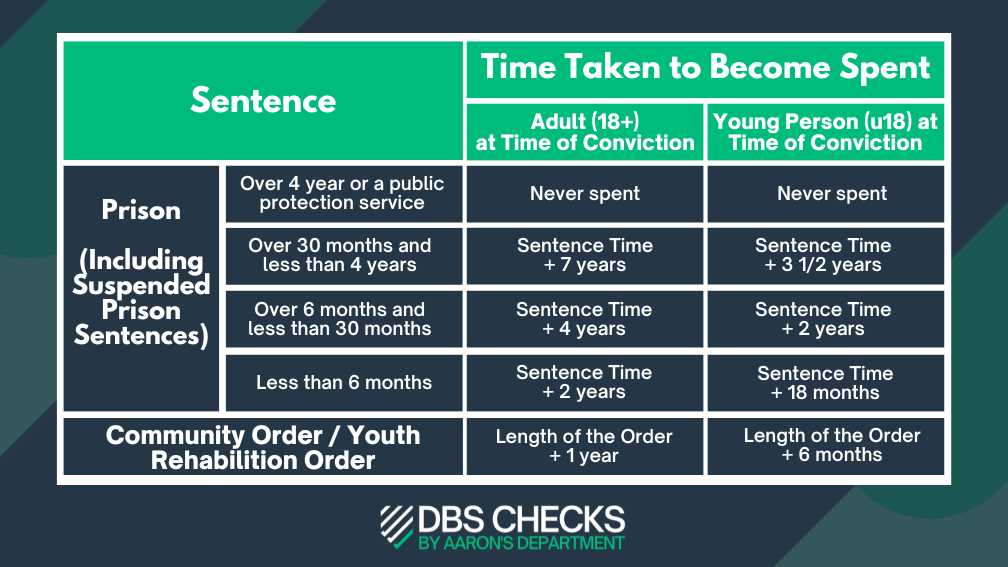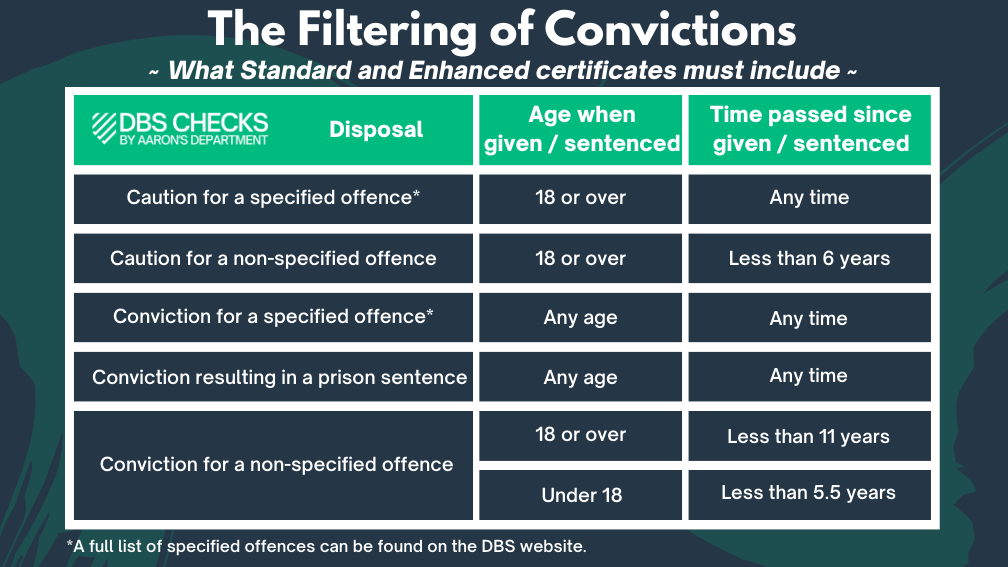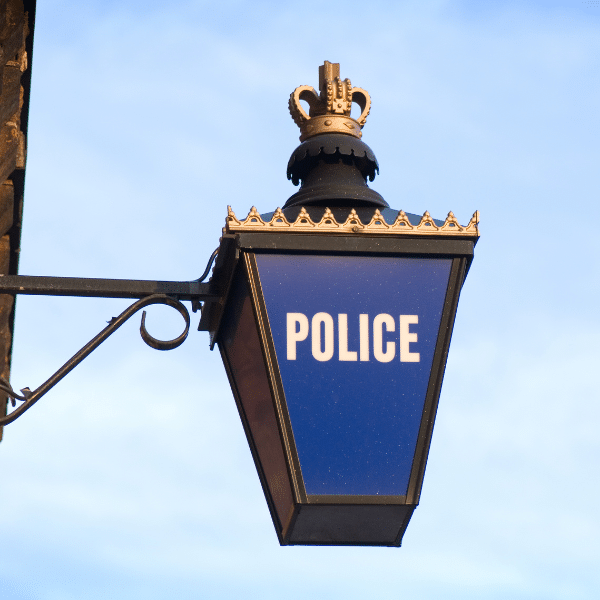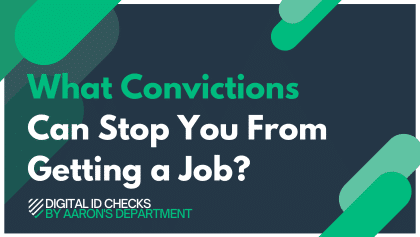Table of Contents
What Convictions Can Stop You From Getting a Job?
With over 11 million people having some sort of criminal record in the UK, how can a criminal record affect job opportunities? Well, it all depends on the severity of the offences which have been committed, and what job role is being applied for.
This guide will take you through what convictions can stop you from getting a job and the ins and outs of the impact a criminal record can have on people in England and Wales.
What Offences Show up on a Criminal Record Check UK?
Spent & Unspent Convictions
Whether an offence shows up on a DBS check depends on if the convictions are “spent” or “unspent”, and the type of DBS check being applied for.
The Rehabilitation of Offenders Act 1974 is intended to allow those with a criminal record the ability to integrate better into society by designating most offences as “spent” after a certain period of time has passed since sentencing. If a conviction is spent, it will not be disclosed on Basic DBS checks, and while it will still be disclosed on Standard and Enhanced DBS checks, employers are not permitted to take them into account when considering applicants for roles.


You can use the table adjacent to check whether your conviction is spent, and we’ve also linked two excellent resources below:
- The gov.uk spent conviction checker – This tool allows you to input the details of your offence, and calculates if, or when, it will be spent.
- The gov.uk guidance on rehabilitation periods – This page contains a table of offences, and how long/whether these offences will be spent. It isn’t very well formatted, but it’s functional and offers examples.
Filtered Convictions
Once an offence has become spent, there’s also the possibility for it to become “filtered”. Filtered convictions will not appear on any DBS checks, and will never need to be declared.
The Filtering of Convictions is mostly limited to offences committed while under 18, or where only a caution / reprimand / warning was handed down as a consequence.
“Specified Offences” will never be filtered – these tend to be offences of a violent or sexual nature. Click here to view the full list on the gov.uk site.


Do You Have to Disclose a Criminal Record When Applying for Jobs?
When applying for jobs, your employer is legally entitled to ask whether you have any unspent convictions, and if they do this, you are legally obliged to answer them truthfully. Employers are permitted to consider unspent convictions when making employment judgements.
If you are being asked to complete a Standard or Enhanced DBS check, however, it means that the role in question is exempt from the Rehabilitation of Offenders Act 1974.
This means you are legally required to disclose both spent and unspent convictions & cautions – both will show up on your DBS certificate, although the employer is not permitted to consider spent convictions when making employment judgements.


Standard and Enhanced certificates will only ever be posted to the applicant’s address, and it is their decision upon receiving it whether they show their employer. Roles that require a Standard or Enhanced DBS check tend to involve working with children and/or Vulnerable Adults in areas such as healthcare, education, law, or finance.


What Convictions Can Stop You From Getting a Job: The Barred Lists
Unless the applicant is on either the Adults’ or Children’s Barred Lists, this is the employer’s decision to make. Some offences, particularly violent or sexual offences, will place individuals on the Barred Lists, which makes it illegal for them to apply for, or to be hired for, any role involving the groups they are barred from.
If you’re on the Barred Lists, you’ll have been made aware of it, but for more information read our guide to the DBS Barred Lists.
Summary: What Convictions Can Stop You From Getting A Job?
If you have any unspent convictions or cautions, it is entirely up to the employer to review these and decide whether to offer you the position. However, if you have been placed on the Adults’ or Children’s Barred Lists, it is illegal to even apply for a job that involves working with a group you are barred from, and it is also a crime for the employer to hire you.
Aaron’s Department offers fast-tracked, affordable, error-proof DBS checks for employers. Sounds too good to be true? Sign up (for free) to find out, or get in touch. Drop us an email at contact@aaronsdepartment.com, or call 0113 877 0171, and we’ll provide any extra info you require.
Forward this page!
What Convictions Can Stop You From Getting a Job: Further Reading
If you’ve found our page, “What Convictions Can Stop You From Getting a Job?” useful, take a look at these related pages for some extra info:
About The Author


Kellie Dawson
Kellie is our in-house legal expert when it comes to DBS checks. With a background in the legal sector, she has become a recognised authority in this area.

I need to write a letter to take off my Caustion from a DBS
Hi Rose,
You can find all contact information for the DBS here: https://www.gov.uk/government/organisations/disclosure-and-barring-service
Hi, can I become a chartered accountant with a criminal record? If I wasn’t f2f with joe public
Hi Wayne,
Yes you can, this is definitely possible!
Hi I applied to be a volunteer paramedic, got accepted my dbs came back with my conviction spent 17 years ago , I had 18 month suspended sentence , and put no for no criminal record, as I was completely unaware it would show up after all this time , and already had 2 dbs prior and nothing was mentioned to me .
I’m now having to have meetings and waiting on dbs panel to decide my fate as they think I lied , but I was completely unaware it was still on their .
Hi all,
I am facing a sexual charge.I gave my niece a hug and peck kiss for her 19th birthday.The public prosecution claims it was sexually motivated.Makes me sick 🤢.If convicted of these lies,am I prevented from doing a finance or admin job?
Thanks.
R
Hi Robert,
You may not be prevented from doing a finance or administration role, but if asked about any convictions, you will have to declare the conviction to any potential employers. If you are barred from working with a vulnerable group, it is illegal for you to apply, work, or be hired, for a role that involves working with that group. This article may help you with additional information. https://www.aaronsdepartment.com/can-i-pass-a-dbs-check-with-a-criminal-record.php
Thank you